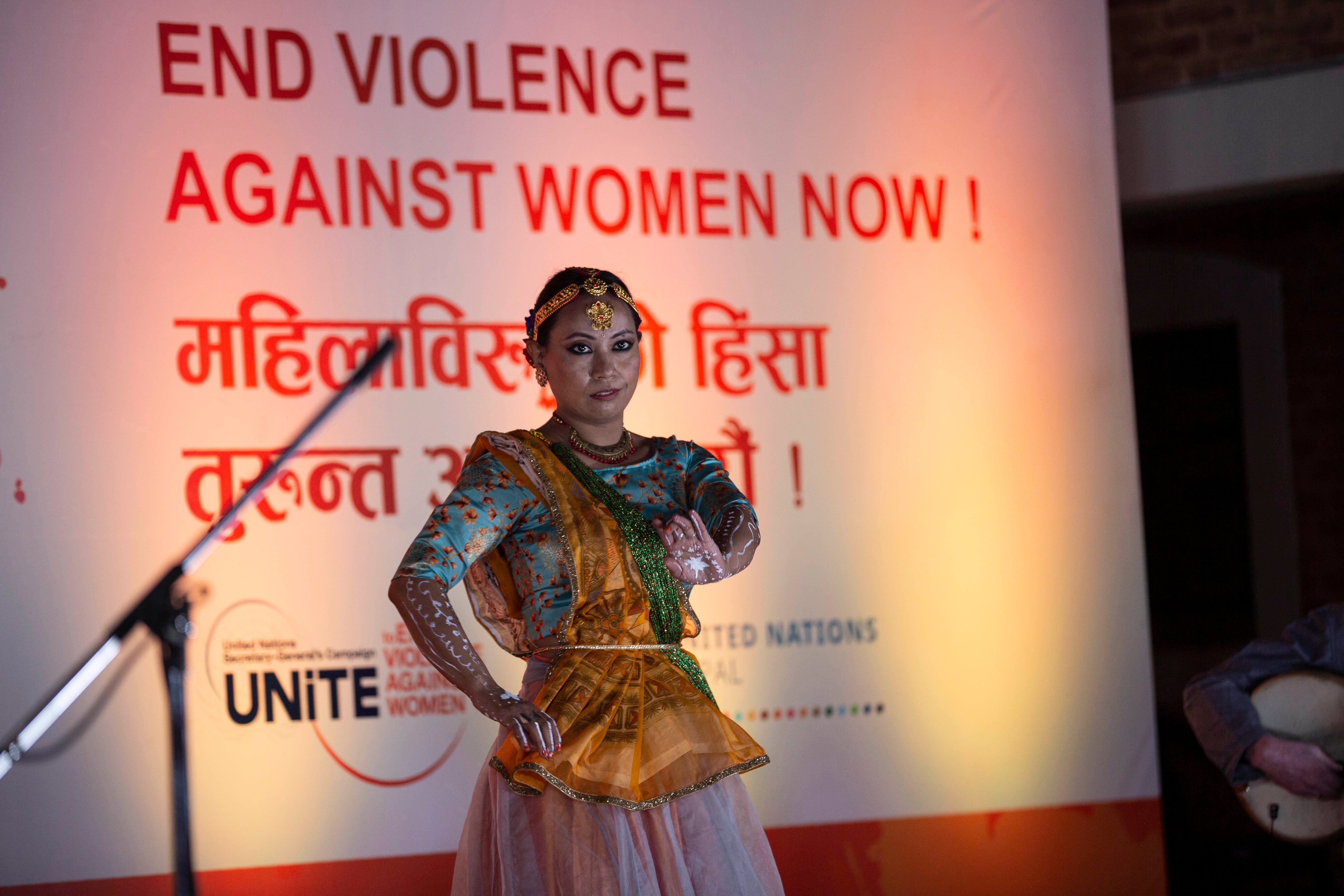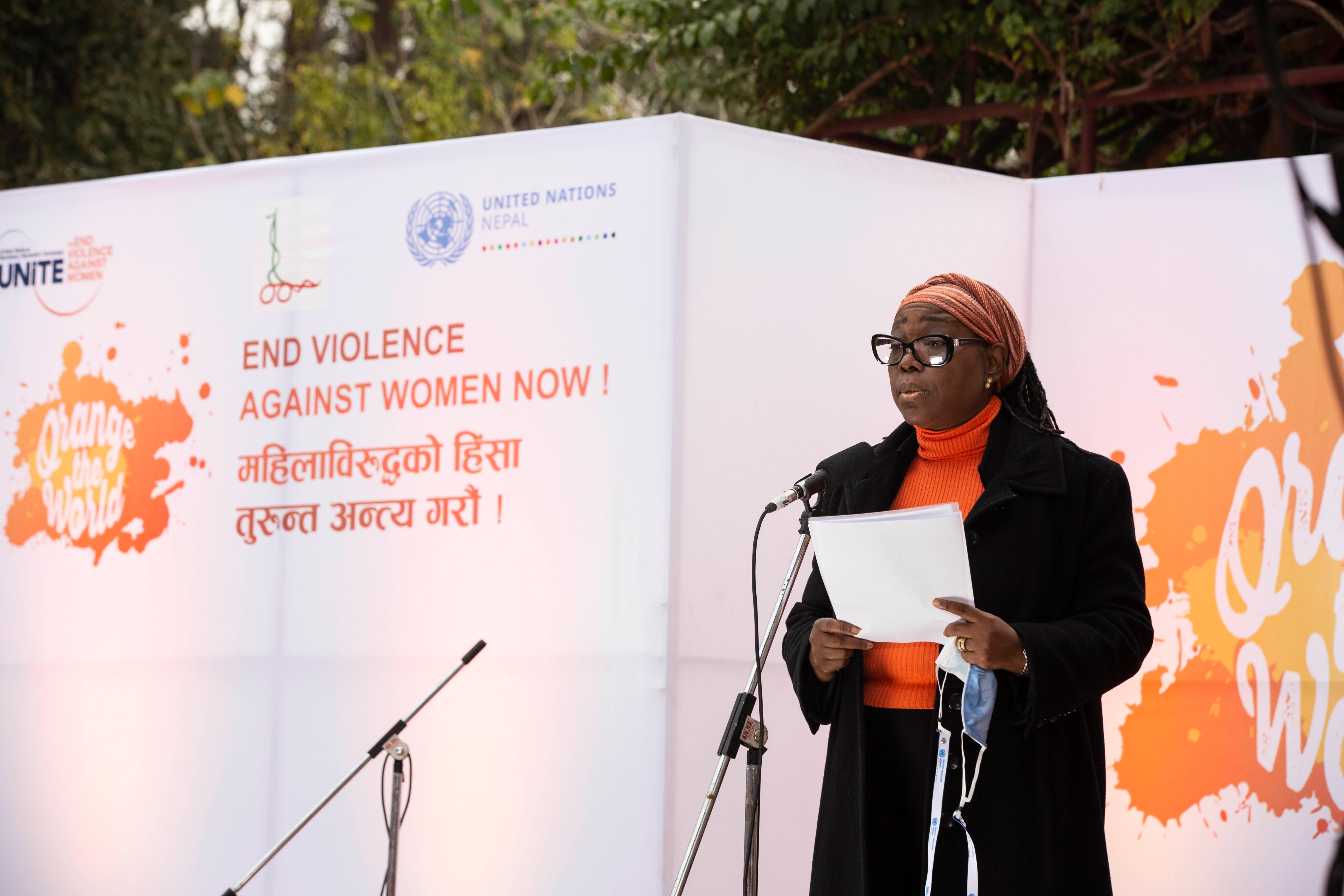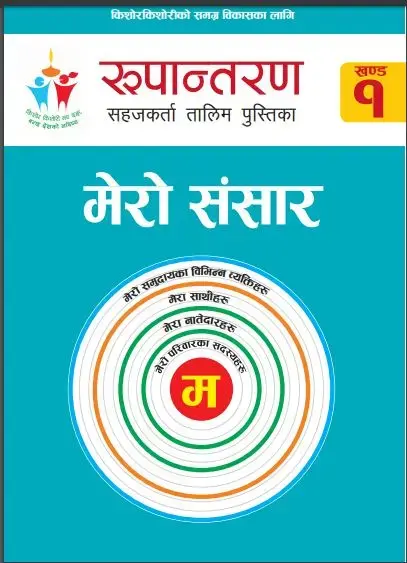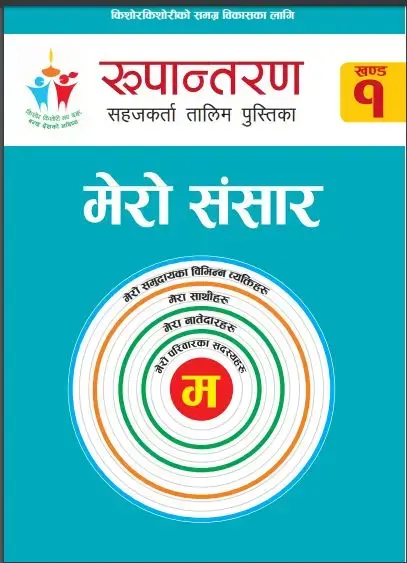Kathmandu, 25 November 2020— Survivors of gender-based violence and gender rights activist in Nepal have called for inclusive approaches and comprehensive reforms to eliminate gender-based violence prioritizing the most marginalized women and girls.

On the occasion of the International Day for the Elimination of Violence against Women and start of 16 Days of Activism Against Gender Based Violence, survivors, gender equality activists and representatives from the UN, development partners, and the government came together to commit to take action to end gender-based violence now! The event, streamed live from Patan Museum Courtyard, gave center stage to the stories of GBV survivors as well as to gender equality activists to present a joint statement calling for inclusive and comprehensive reforms to eliminate gender-based violence.
Jenny Khadka, an acid-attack survivor, emphasized everyone’s role in preventing gender-based violence. Ashmita Badi, a poet from Surkhet reiterated how patriarchy stands in the way of a world free of violence. Sharmila Thapa, Nurse and a Member of the Trade Union questioned normalization of GBV at the workplace. Similarly, Babita Rai, Feminist Writer shared about sexual harassment and urged for a world free of violence. Lastly, Kathak dancer Subima Shrestha portrayed the grief and perseverance of Gauri Bista, a survivor of domestic violence and women’s rights activist from Doti, through her dance in the song written by Bista herself. Through their stories, the advocates called for urgent action to change discriminatory social norms, policies and laws to prevent gender-based violence.
In the joint statement, Shova Maya BK, Disabled Women’s Rights Activist, Kala Swarnakar, General Secretary, Feminist Dalit Organization, Nagma Khan, Queer Rights Activist, Prakriti Bhattarai, Chairperson, Political Literacy for Women, and Dorje Gurung, Educator and Activist, called for action from the government, multilateral and bilateral organizations to:
- Repeal constitutional and legal provisions on legal identity and citizenship to address existing gender discriminatory provisions.
- Amplify efforts to end violence against women and girls with intersectional identities (such as caste/ethnicity, religion, geography, disability, gender and sexual minority) through interventions and policy reform tailored to their specific needs.
- Strengthen and intensify response services to GBV through establishment of fast track courts, well-functioning multi-sectoral support system (e.g., health, legal aid, shelter homes, psychosocial support, interpretation services) and increase access to these services for service-seekers focusing on needs of women and girls from marginalized communities.

“Across the globe gender-based violence continues with impunity, survivors’ stories silenced while perpetrators evade justice. Today we say, enough with the silence. Stop the Violence Now.” said Sara Beysolow Nyanti, UN Resident Coordinator, International Development Partner’s Group Co-chair and representing multilateral development partners.
Speaking at the event, Excellency Nona Deprez, European Union Ambassador, Development Partner’s Group Co-chair and representing bilateral development partners expressed, “Ending gender-based violence is non-negotiable. Nepal has worked really hard to have a strong legal framework to combat GBV, which is a real achievement but there is still so much work to be done. It is important to break the cycle of violence”.
During the programme, Under-Secretary Ram Hari Sharma from Ministry of Home Affairs shared that the Ministry has initiated discussions to formulate law related to acid attack as the previous ordinances related to acid attack issued has become ineffective. Dipti Karki, Deputy Superintendent of Police also shared her commitments to end violence against women and girls.
Wrapping up the commemoration event, the UN Country Team lit up Patan Durbar Square Museum and Dharahara in orange, the official colour of the UNiTE campaign, that symbolises hope and a country free of violence.
+++++++++++++++++++++++++++++++++++++++++++++++++++++++++++++++++++++
For queries, please contact;
Simrika Sharma; Tel: 9841592692 Email: Simrika.sharma@one.un.org
Subeksha Poudel; Tel: 9851109136 Email: Subeksha.poudel@unwomen.org
Editor’s Note
The 16 Days of Activism against Gender-Based Violence is an international campaign which takes place each year. It commences on 25 November, the International Day for the Elimination of Violence against Women, to 10 December, Human Rights Day. It was originated by activists at the first Women's Global Leadership Institute in 1991 and is coordinated each year by the Centre for Women's Global Leadership. It is used as an organizing strategy by individuals and organizations around the world to call for the prevention and elimination of violence against women and girls.
As a unifying theme running global activities, the UNiTE campaign has utilized the colour orange to represent a brighter future, free from violence against women and girls. The UN Country Team (UNCT) in Nepal has marked 16 days campaign with awareness building and advocacy campaigns across Nepal. Some of the key activities undertaken were ‘oranging’ monuments and provincial buildings, engaging audience across Nepal through films, social media, and radio campaigns. In Nepal, the UN Country Team (UNCT) has marked the campaign during the past years, including ‘oranging’ of Patan Darbar Square (2016), Lumbini (2017), Provincial Parliament Buildings (2018), Women’s March in Janakpur (2019), and an online dialogue on ‘The Role of Media in Changing Mindsets: One story of gender-based violence is one story too many’ (2020).
The cases of gender-based violence’s have been increasing annually as per the reports from Nepal Police.[1]According to the three years study done by Nepal Police from 2018- 2021 total 8571 cases of sexual violence (mainly rape, attempt to rape, child sexual abuse), 209 cases of child marriage, 38737 cases of domestic violence have been registered across Nepal. Review the status of limitations of sexual abuse of children to ensure cases can be brought against offenders.
A study[2] highlighted that gender-based violence and gender equality funds are not currently operational. Those that are functioning to a degree – such as the GBV Elimination Fund and the Rehabilitation Fund – exist at the federal level and not at the provincial or local level, which restricts women’s access to these funds. In this context, there is an urgent need to make funds available and ensure that women have access to essential services, including gender-based violence services.[3] There is an urgent need for gender responsive budgeting and tracking allocations for gender equality and for achievement of Sustainable Development Goal 5 – Gender Equality. A coordinated, multi-level and multi-sectoral approach is recommended to prevent and respond to the potential increase in gender-based violence in Nepal[4].
[1] Reported incidents of child marriage, witchcraft allegations and untouchability have increased annually, according to Nepal Police data on FIRs registered between FY 2016/2017 and September 2020. National Women Commission (NWC): A Study on the Implementation Status of Concluding Observations of United Nations Committee on the Elimination of Discrimination against Women (CEDAW Committee) on the Sixth Periodic Report of Nepal, June 2021
[2] Forum For Women Legal Development (FWLD) and Himal Innovative Development Research Pvt Ltd (HIDR), Policy Brief: Nepal’s Gender-Based Violence and Gender Equality Funds: The Path to Effective Implementation, 2021, available at https://nepal.un.org/sites/
[3]Ibid.
[4] National Women Commission (NWC), A Study on the Implementation Status of Concluding Observations of United Nations Committee on the Elimination of Discrimination against Women (CEDAW Committee) on the Sixth Periodic Report of Nepal
June 2021




